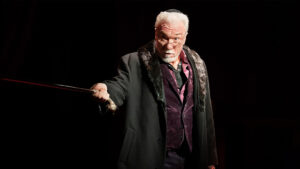BY KAY SCHROVEN
Thursday, Oct. 17- a full moon, Halloween on the horizon, and “All the Devils are Here” (produced by Octopus Theatricals productions) opens on the McGuire Proscenium stage at the Guthrie Theater.
This is a one-man play about the dark side of humanity, a tour through Shakespeare’s invention and development of the Villain. Actor Patrick Page is our tour guide; a Tony nominee with a long list of theater credentials including having played many of Shakespeare’s villains. In “Devils” he has created and performs his intense, fast-moving chronology of Shakespeare’s darkest antagonists. Teaming up with Simon Godwin, Artistic Director of D.C.’s Shakespeare Theater Co., the pair inject full life into this national tour, launching at the Guthrie.

Patrick Page in All the Devils are Here at the Guthrie
Page loves Shakespeare and wants to introduce his work to new generations by eliminating the intimidating quality. In addition to powerfully presenting some of Shakespeare’s greatest soliloquists, Page engages in explanations and examples from modern times we all can identify with. For example: after describing Shakespeare’s launch into the art of play writing in 1590s London, he refers to a pause in the man’s career when theaters shut down due to a plague (bubonic), then slowly adds, “We can all now understand that one.” The audience laughs. Later in the play as Page reads the list of today’s known characteristics of sociopaths he comes to the last characteristic, “Fails to accept defeat.” Many audience members clap, some stand and clap. Hmmm….
In Shakespeare’s early years the term “villain” was assigned to the crippled, mentally ill and “dark-skinned.” When he fell in love with a dark-skinned woman, Shakespeare was forced to reexamine the prejudices of his time. Over his 20-year writing career (1590-1611) his villains evolved and changed into scoundrels, rogues, tyrants, outcasts and wrongdoers and were no longer identified by physiognomy (general form or appearance.) Shakespeare was deeply curious about what humans were capable of; what WE are capable of. Again and again, he explored Lust (Angelo in “Measure for Measure”) Greed (Edmund in “King Lear”) Jealousy (Iago in “Othello”) Envy (Richard the III in “Richard III”) and Rage (Shylock in “The Merchant of Venice”) to name a few. He examined the concept of a conscience or lack thereof and asked, “Why do people do bad things?”
Lighting (Stacey Derosier) and sound design (Darron L. West) play major roles in this dim red and black scenic stage design (Arnulfo Maldonado.) What does hell sound like? Look like? It is not bright or complex, it grinds, cranks and buzzes producing low sounds that are almost inaudible at times yet infiltrate the senses, tugging on our nerves. The single actor moves about the stage encased in a boxlike structure of metal, set with lights that change with the moods of the play and provide a practical purpose of shelving props such as knives and spears which are used by Page throughout, as he brings Shakespeare’s drama to life with his rich voice and skilled use of his body.
Page loves his villains, “Love them or loathe them, there is something irresistible about villains.” In an interview with Chloe Rabinowitz, (Broadway World Managing Editor) Page declares that he is “A little terrified of people who are attracted to the hero because it indicates a shunning of their darker side, which we all inevitably have.” He goes on to describe the villain as broken, with challenges and flaws. He adds, “It is only in exploring that darker side of ourselves that we can find any light.” The plays ominous title is pulled from Shakespeare’s “Tempest”, “Hell is empty and all the devils are here.”
The play is about 90 minutes without intermission.
On the Guthrie Theater stage through Nov. 17.
Box Office 612-377-2224; boxoffice@guthrietheater.org






















